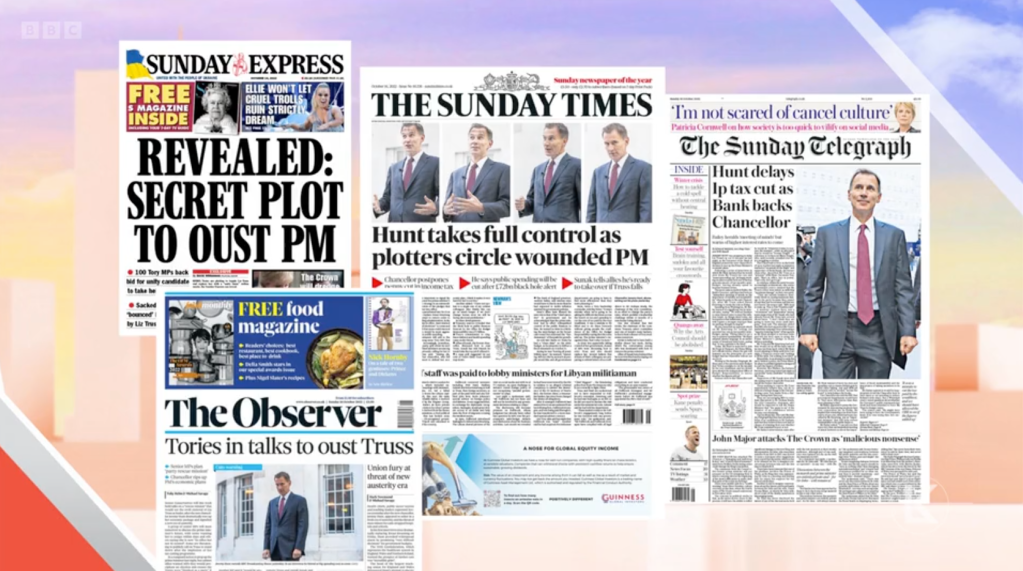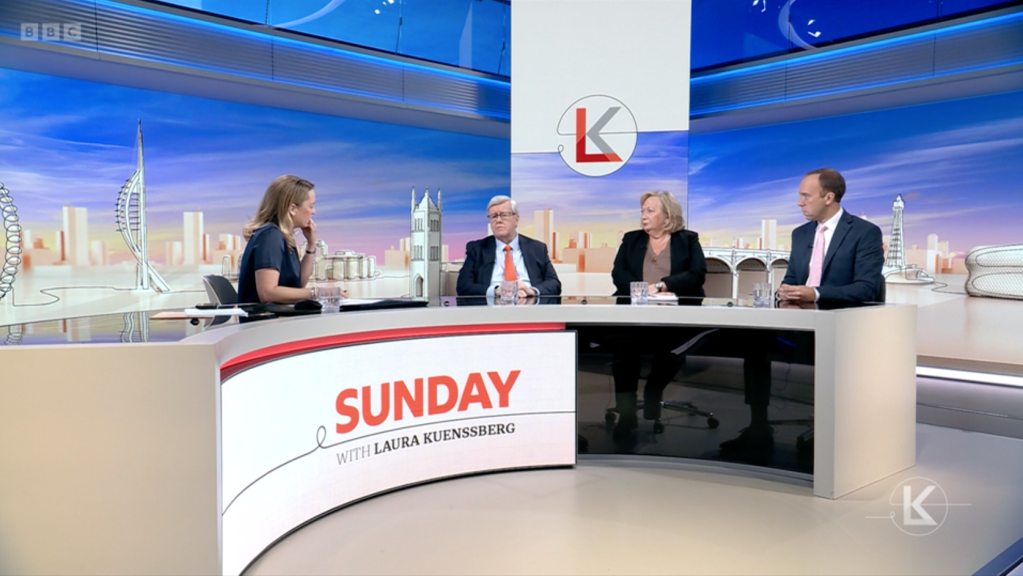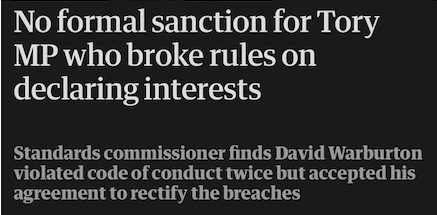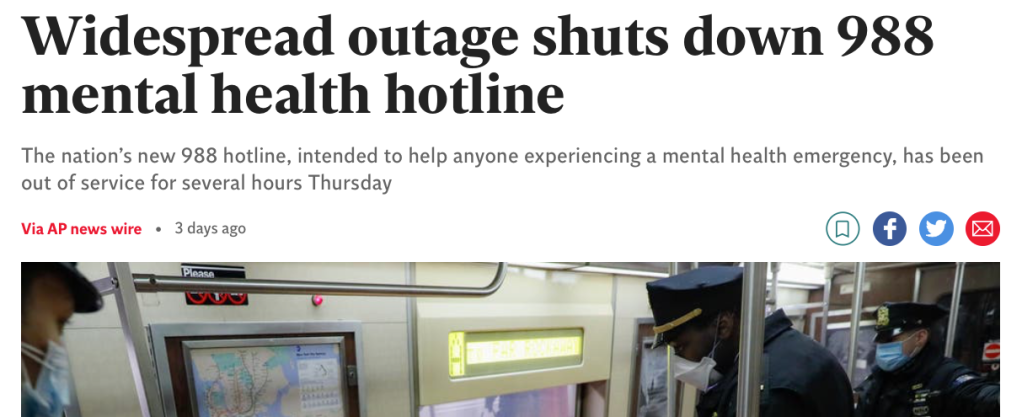
As this blog is fond of saying, there’s nothing like page one. While breaking news went online a while ago, British newspaper front pages still retain a salience vastly in excess of their dwindling sales: nothing beats them for rhetoric, and nothing in the digital realm has been invented that has their capacity to summarise the events of a calendar day.
Despite app alerts and rolling broadcasts, the 24-hour news cycle still exists, and nothing fits into it quite so well as a daily newspaper. That is one reason why there is still a What The Papers Say-style segment on TV and radio news programmes, morning and evening. Or at least, why there has been until now.
However, the BBC TV’s new flagship politics show, Sunday with Laura Kuenssberg, seems to be breaking with this tradition. Whereas her Sunday-morning predecessor, Andrew Marr, would show every paper in turn, poring over sellotaped double-page spreads and holding articles up to the camera, Kuenssberg throws up a perfunctory montage of some, but not all, of the front pages on a single screen before pulling it down again and turning to her guests. Marr used to have two journalists on the show to talk about the journalism; Kuenssberg seems to operate an anyone-but-hacks approach for her three-person panel, who discuss issues at her prompting with scant reference back to what the papers have actually been saying.
The blog has dreaded this moment: the possible first signs of the waning currency of the front page. I rather thought it would happen as a result of the advance of online news organisations into the discussion (where they are fully entitled to be), rather than simple lack of interest in the Fleet Street agenda. Nonetheless, it’s unsettling.
Does it matter? Of course it does to a middle-aged print hack like me, but more widely? I think so, especially given what has been said about social media recently in the US culture wars.
Over on HeadsUp, there is an excellent post about the fallout from the “Twitter Files” – the leak approved by Twitter’s new owner, Elon Musk, of discussions on censorship and moderation under the site’s previous management. It cites one of the journalists involved in publishing the leak, Matt Taibbi, who writes that he had felt “the version of the world” he had been receiving from Twitter pre-Musk had been “distorted” and “ridiculous”, and that the discovery of the moderation discussions had been a “balm” for him.
“This is the reality they stole from us!” he writes of the censors, making the complaint often heard on the American right that liberal censorship and “cancel culture” has silenced certain voices in certain debates, including ones he wanted to hear on Twitter.
However, as HeadsUp puts it:
What baffles me most about the “Twitter Files” is the quaint belief that someone – generally “our elite overlords” or some variant on that – monkeyed with Twitter and ruined forever the level media playing field on which American politics had played out from the dawn of time through 2019 or so.
To which one could go on and on, but – has AM radio just entirely vanished from public consciousness, or did none of you out there hear Rush Limbaugh’s “Largest Radio Rally in History,” featuring two hours or so worth of Donald Trump… four weeks before the 2020 election?
True, the infamous Hunter Biden laptop (or the copy of its hard drive, or whatever) doesn’t come up in that transcript, but it was certainly no secret to the Limbaugh audience in the weeks before the election. You can try your own site search at foxnews.com (replete with complaints about the rest of the media). What you can’t do is say that reality was somehow stolen from you because your message wasn’t front and center on every platform.
That last point skewers the weakness in this type of argument perfectly: no media organisation is necessarily obliged to align its values completely with one’s own. Twitter was entitled to be dubious about the bona fides of the Biden laptop story: Fox News is fully entitled to embrace it. Both are private companies with the power to set their own rules, standards and agendas. A disagreement on this issue with one social media network – and one that is far from being the largest in the world – is not evidence of a conspiracy.
In times gone by, there was a tradition of impartiality, or hands-off fair dealing, in mainstream American journalism, where newspapers with geographical monopolies would play it straight down the middle, politically speaking, so as not to alienate half their captive audience. Critics of the US media scene, such as Prof Jay Rosen, have dismissed this approach as “the production of innocence” – an artificial neutrality that can fail its readers when difficult truths need telling. And in any event, as HeadsUp says, the advent of new media in the form of Fox News and shock jocks has shattered the old non-partisan model.
But it’s tempting to wonder if some of that tradition still informs the likes of Musk’s and Taibbi’s expectations: that there should somehow be one “version of the world”, one consensus “reality” that sounds the same from all media outlets. If so, it is an American rather than a wider anglosphere problem, because British audiences – thanks to the partisan excesses of Fleet Street – have never believed that.

As a whole, the British newspaper industry will never present what Barack Obama calls an “agreed set of facts”, but it does manage to produce a plurality of facts – a sense that, taken in the round, most stories, from most points of view, have a chance of being covered. And it’s long exposure to this – at the newsstands, or in the broadcasters’ press reviews – that I think insulates the British public from the slightly paranoid fear of having “reality stolen” in the way Taibbi describes.
The UK national press has never been trusted for its probity, but it is, grudgingly, trusted for its breadth. It ranges so far to the left and right that most constituencies feel their views and concerns are getting an airing. The messages are not front and centre on every platform, but they will usually be on one or two. This has also led to a sophisticated form of media consumption in Britain in which even hated papers will be given a selective hearing if it appears that they’ve got something big – think of the Guardian on the Windrush scandal, the Daily Mail on “smart” motorways, or the Telegraph on MPs’ expenses. British readers have learned to look past newspapers’ glaring institutional biases if the bona fides of a story are convincing enough.
One of the main reasons this mechanism functions is because of programmes such as What The Papers Say and its successors. Because broadcasters are regulated for impartiality in the way papers are not, they must be even-handed about every front page they show, but are not obliged to identify with any of them. Meanwhile, the parade of different agendas and political positions, one after the other as the front pages flash through, is broadening and chastening for viewers: you see your concerns aired in one headline, but a quite different set of priorities in the next one. Many “realities”, not just one.
However, if you take the Kuenssberg approach of curating the talking points and reducing the warts-and-all selection of front pages, you lose that sense of a world beyond the careful broadcast-news consensus. In effect, you take the responsibility of setting the news agenda, the points for discussion, yourself, rather than letting the papers do it for you – and perhaps eventually exposing yourself to criticism, like Taibbi’s, that you are narrowing the discussion.
Fleet Street is guilty of many sins, but its journalism still plays a vital role in complementing public broadcasters’ – not because it is better, but simply because it is more plural.

















